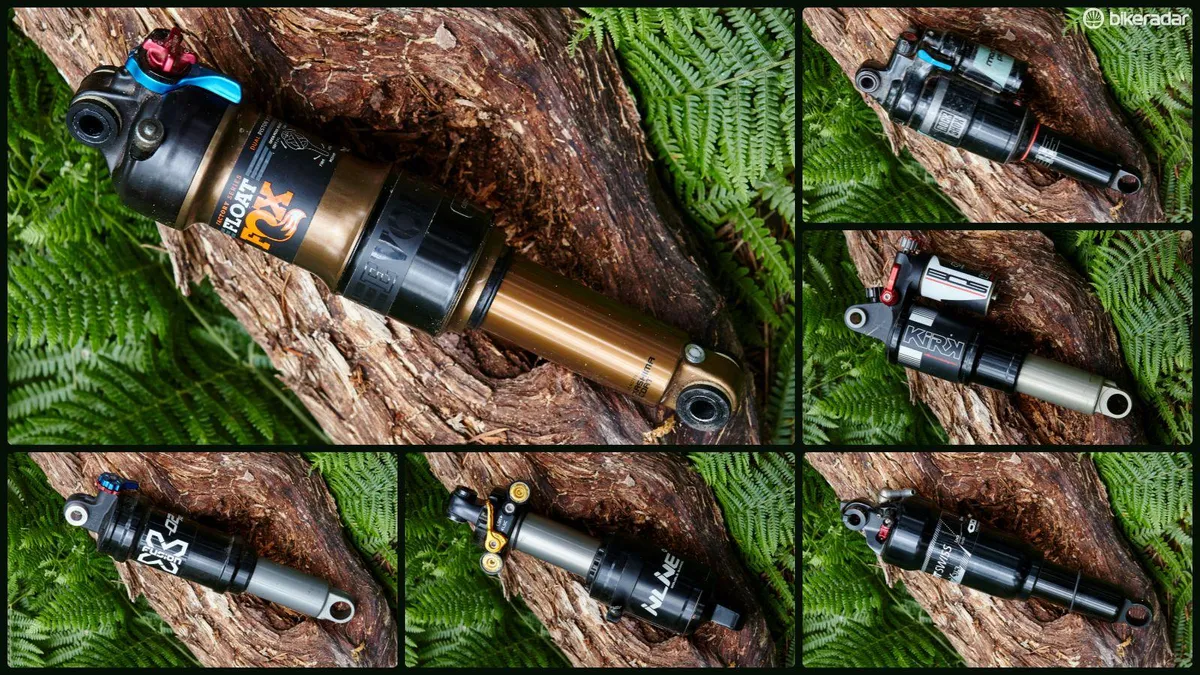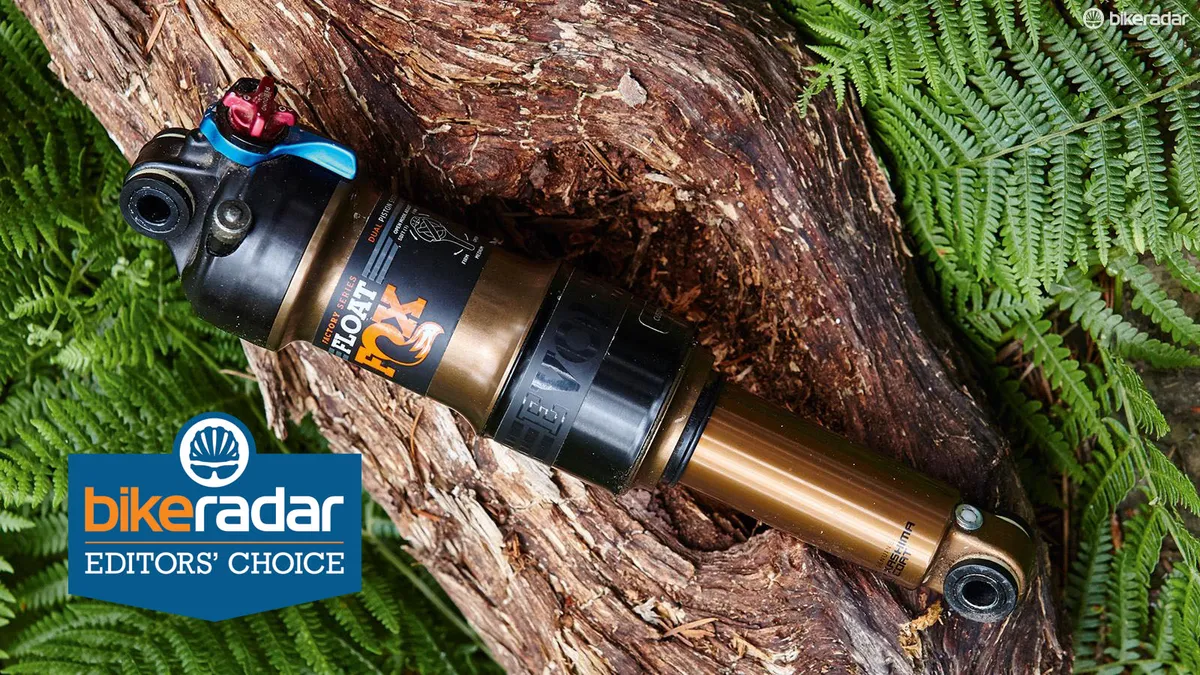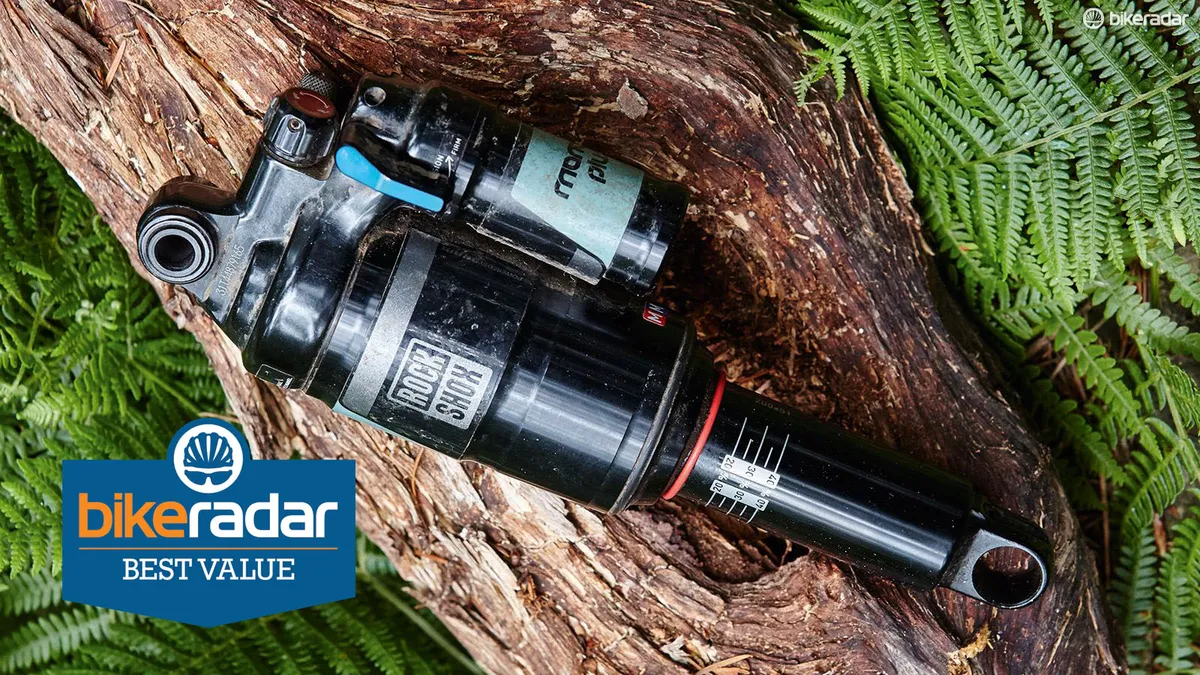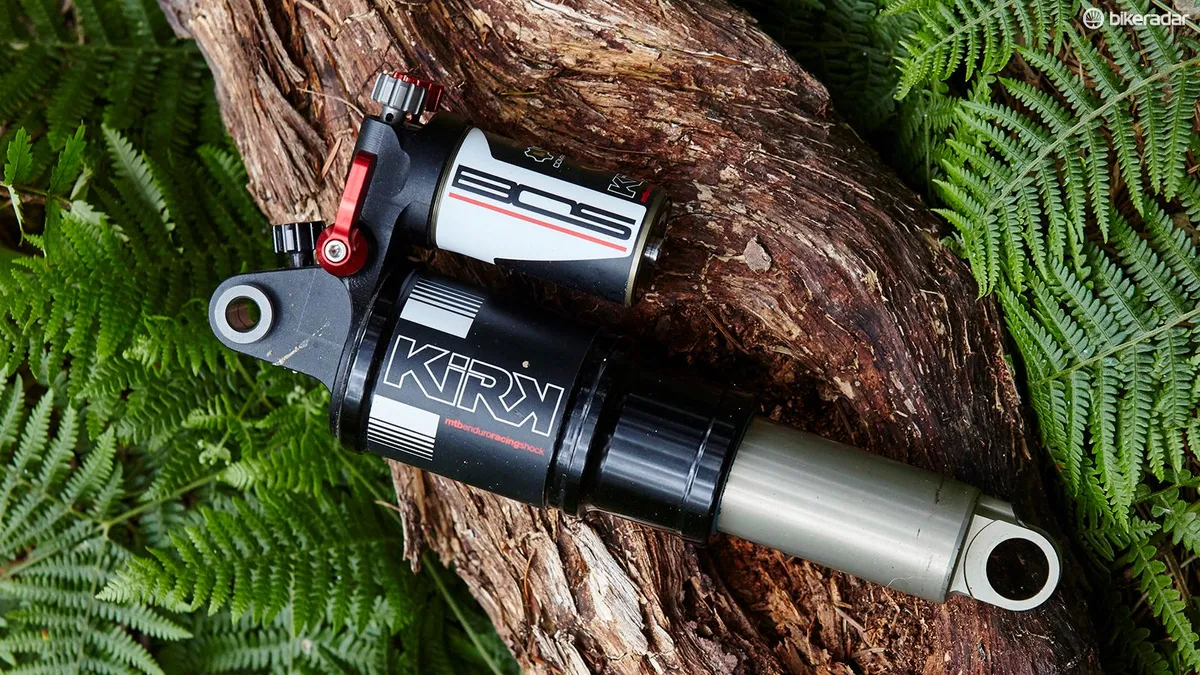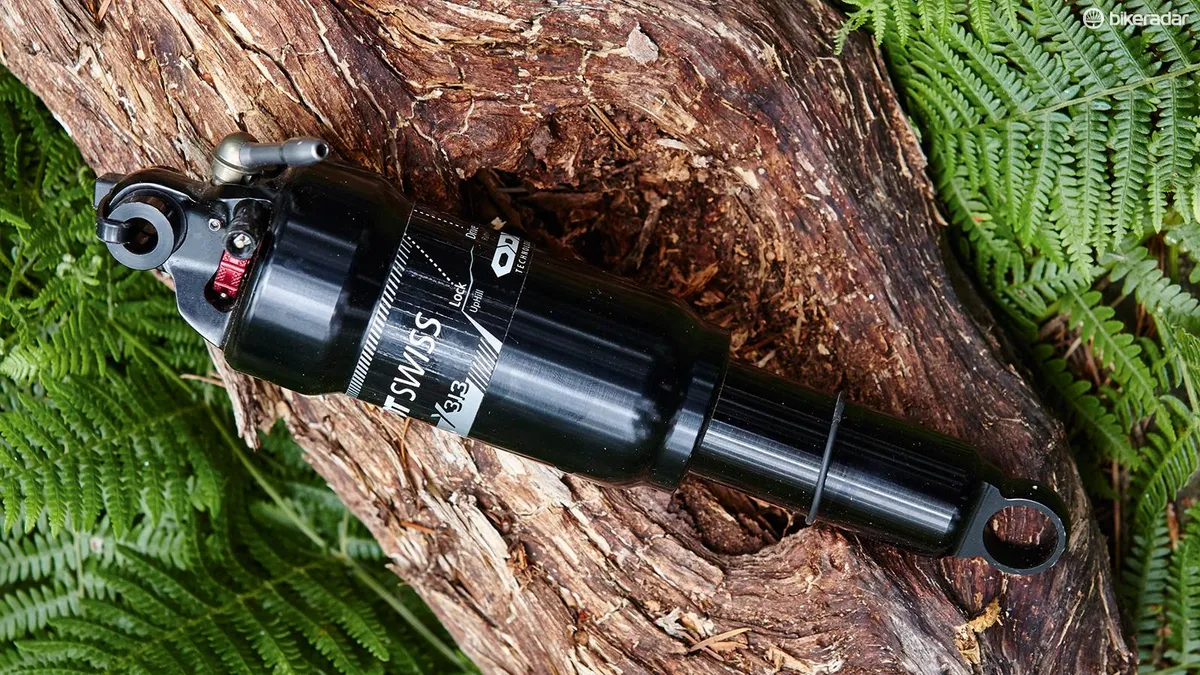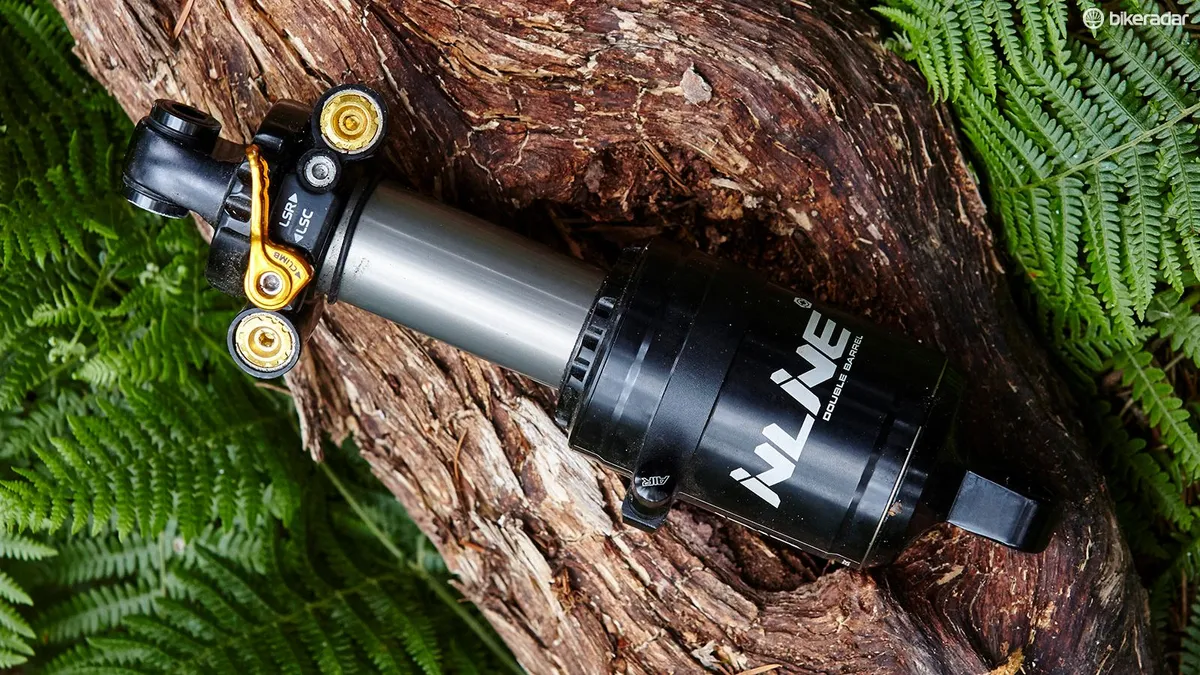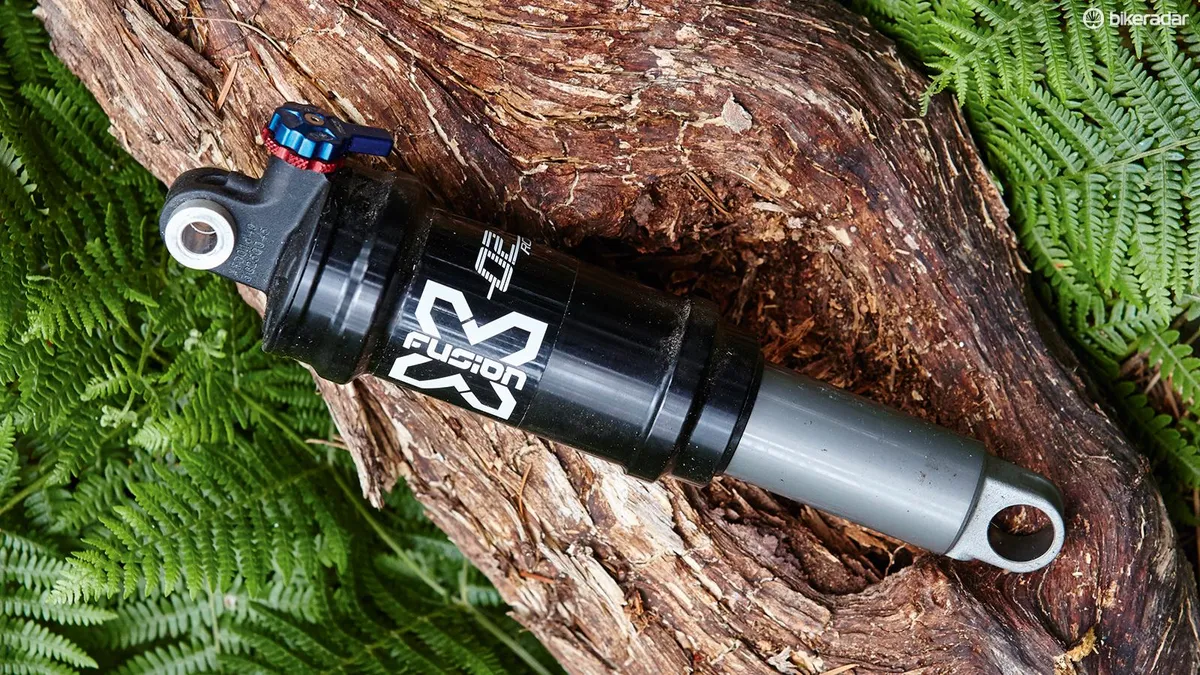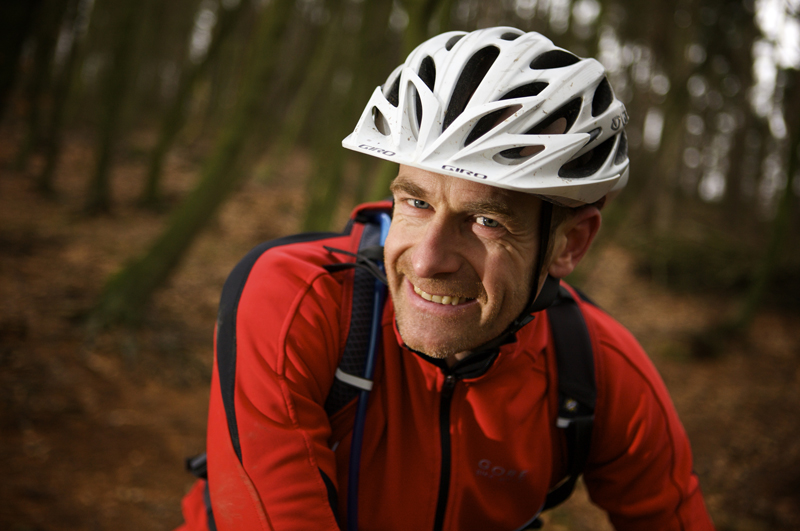A new shock can significantly alter the way your full suspension bike rides and the amount of control and confidence it delivers. Choosing the right shock for your bike, your riding style and your level of technical knowhow isn’t easy though. The fact that shocks are evolving so fast that the benchmarks are getting rewritten every few months doesn’t help either.
The first thing to check is whether the shock actually fits your bike. The extra damping chamber on piggyback shocks or larger volume air sleeves, or protruding adjusters, can definitely cause problems, particularly on smaller framed bikes. The top of the shock or even the eyelet knuckle can also contact the frame or linkage too. Even if the shock physically fits you need to make sure the valve and adjusters can be reached easily without the frame or the shock itself getting in the way.
Related: Mountain bike suspension forks – a buyer's guide
You also need to work out what you need from a new shock, which means thinking about what’s lacking from your current damper. Sometimes it’s a simple aim such as saving weight or adding a straightforward adjustment like lockout or an intermediate ‘pedal’ damping setting you don’t currently have.
Perhaps you want the smoother initial movement and increased traction of a more sensitive shock or the more consistent heavy use performance of a higher oil volume piggyback shock.
Related: Trail Tech: what type of rear shock is right for you?
Maybe you want the maximum possible damping adjustment or set up sensitivity with separate high and low speed circuits for compression or rebound.
You need to be totally honest with yourself and make sure you actually know how to use any features you’re buying. After all more adjustment can just increase the chance of degrading rather than improving performance if you don’t know what you’re doing or why. In most cases, getting more adjustment or features means spending more too, so don’t waste money buying something you don’t need.
How we tested
Shocks were tested in a 200mm eye-to-eye length in 55mm or 57mm stroke in a pair of Giant Trance SX bikes on a range of trails and terrains for direct comparison. Data was also pulled in from other shocks of the same type being used by our global magazine and web teams, as well as trusted independent riders.
Best MTB shocks
Fox Racing Shox Float DPS EVOL Factory
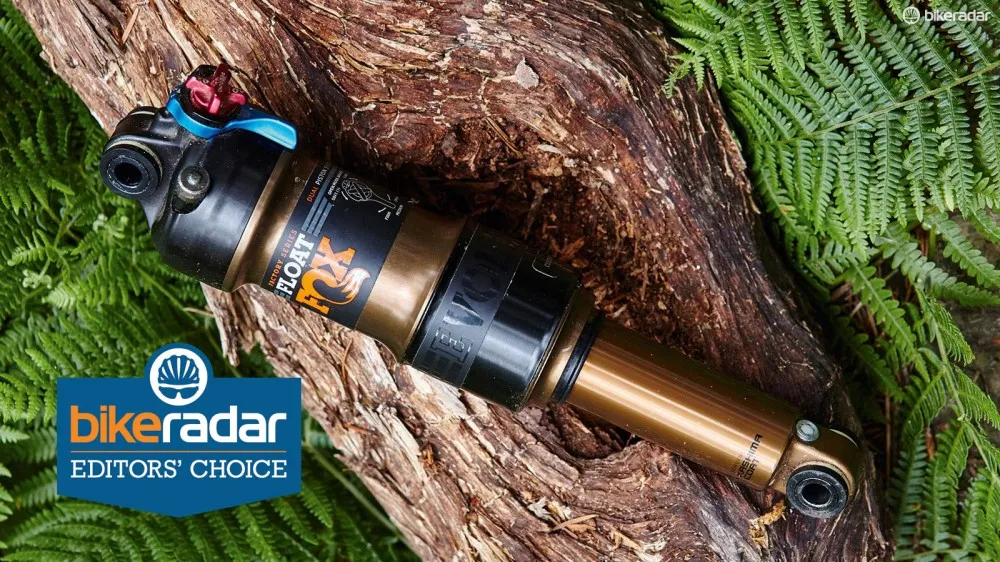
- Price: £380 / US$450 / AU$679 (Sold by Sola Sport)
- Weight: 298g
- External adjustment: three-way adjustable open setting, low speed compression, lockout, rebound
- Sizes: 190x50, 200x50, 200x57, 215x64mm
Fox and RockShox have been battling each other for bike shock supremacy for around 20 years. So it’s no surprise that the former has recently introduced an answer to RockShox’s successful DebonAir developments, leapfrogging back into the everyday performance lead as a result. The Float DPS delivers a wider range of adjustments, thanks to new dual-piston system, and a more linear spring curve, thanks to a new ‘EVOL’ air sleeve. Independent operation of the lockout and open modes is a welcome addition for riders who want the best of both worlds, but the real benefit of the Float DPS is its supple early stroke. We’ve amassed countless hours on the Float DPS on many different test bikes. Performance has been stellar across the board.
• Verdict: More sensitivity, more control and more adjustability - particularly in Open mode - puts Fox back into pole position.
Read our full review of the Fox Racing Shox Float DPS EVOL Factory
RockShox Monarch Plus DebonAir RC3
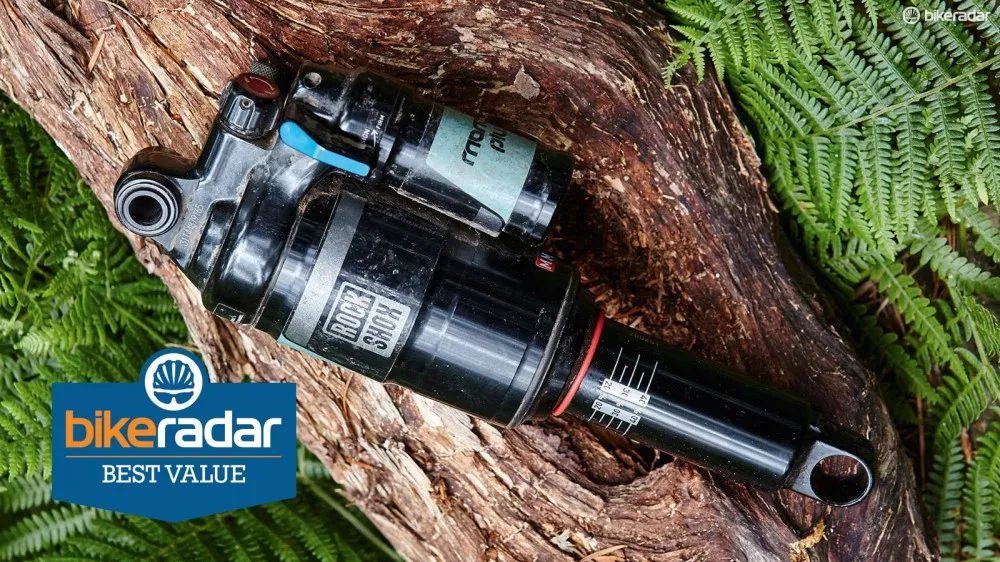
- Price: £400 / US$TBC / AU$740 (Sold by Monza Imports)
- Weight: 390g
- External adjustment: Low speed compression, lockout, rebound.
- Sizes: 190x50, 195x46*, 195x51*, 200x51, 200x57, 210x60**, 216x57*, 216x63*mm *Specialized mount, **Trek mount
RockShox' piggyback shock is the ultra user-friendly baseline that all other shocks are judged against. It's still a great option if you want to think more about the trail and riding than constant shock tuning. We’ve had some of our fastest ever test runs on Monarchs within minutes of starting to ride them, while other more advanced shocks are still frustrating us months later. Considering how many are in circulation, averaged reliability is excellent – which makes the Monarch Plus a perfect fit and largely forget match to RockShox' equally sorted Pike fork. It’s a good price for a piggyback shock too.
• Verdict: Relatively limited tuning but sensitive and sorted default damping makes for outstanding user friendliness.
RockShox / Fisher Outdoor Leisure
Read our full review of the RockShox Monarch Plus DebonAir RC3
BOS Kirk
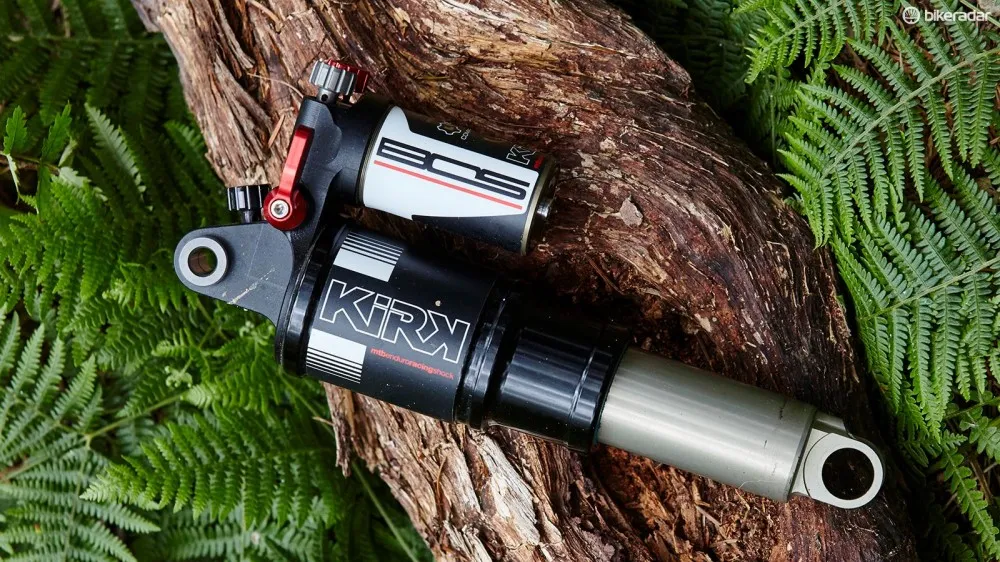
- Price: £599 / US$ TBC / AU$999 (Sold by NSDynamics)
- Weight: 382g
- External adjustment: Low and high speed compression, rebound, ‘pedal optimizer’ lever
- Sizes: 200x51, 216x57, 222x63mm
The BOS Kirk is the most expensive shock here by a long chalk – but for very suspension savvy racers looking for the ultimate in flat out control and a firmly supportive feel, it might just be worth it. Most dampers tread a very fine line between noticeable compression control and sudden spiking, but the BOS adjustments are super subtle. Once you start clicking the high and low speed compression adjustment into place, the full potential of the shock opens up like a cracked safe and its ability to stay composed, on target and in control through the most hectic sections is outstanding. Racers want maximum feedback to pump and drive the bike along the trail, not floppy forgiveness to soak up mistakes. In other words, don’t BOS your bike if you like your trail more latte than double espresso.
• Verdict: Not a forgiving friend, but a very expensive and unapologetically feedback rich, exceptionally tune-sensitive race shock.
Read our full review of the BOS Kirk
DT Swiss X313
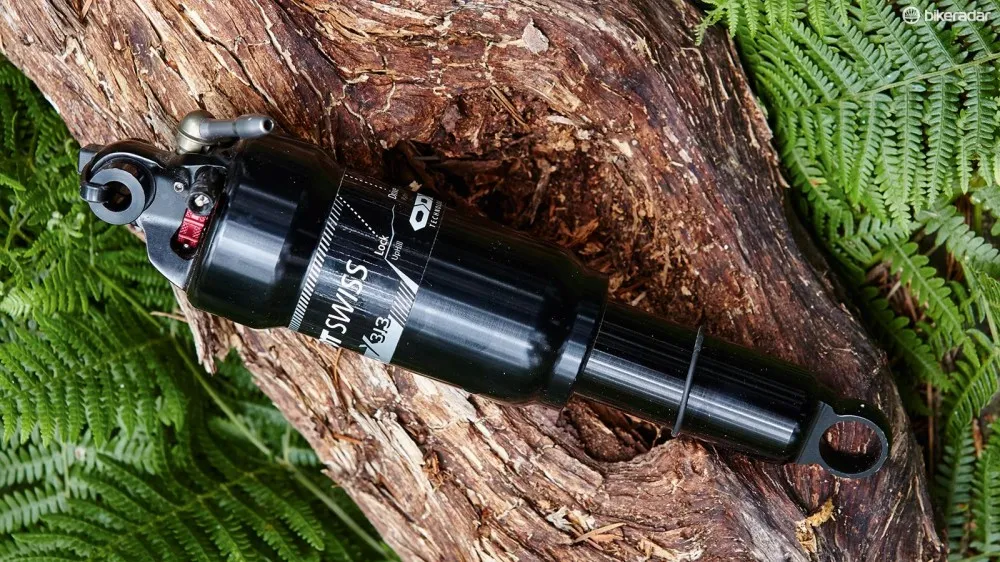
- Price: £320 / US$539 / €399 / AU$ N/A
- Weight: 212g
- External adjustment: Low speed compression, lockout, rebound
- Sizes: 165x37.5, 190x50, 200x50, 200x55mm
DT Swiss has always prioritised low weight, pedal friendly shocks – and the new X313, which is oriented to shorter travel, XC/trail bikes, is true to form. It’s hollow to save weight, making the X313 a definite diet option for your bike – there’s even a carbon sleeved and levered version if you want to save another 50g. The open setting is usefully composed and controlled, with a naturally very progressive spring rate that means you can run low start pressures to overcome an otherwise slightly stubborn start. It can choke and spike occasionally if you’re really start slapping it through successive square edged hits or random rocky terrain. If you think of it more as a partner to a Revelation, 32 or DT Swiss fork rather than a Pike or 36 you’ll be fine though.
• Verdict: Very light, well priced and naturally progressive shock that’s best suited to XC/trail riding.
Read our full review of the DT Swiss X313
Cane Creek DBInline
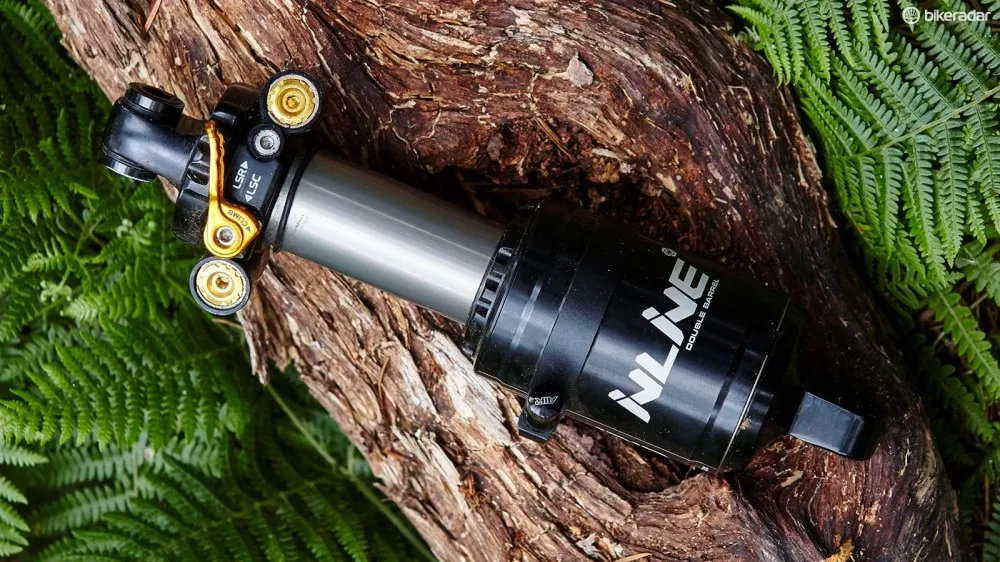
- Price: £385 / US$550 / AU$649 (Sold by DirtWorks)
- Weight: 351g
- External adjustment: Low and high speed compression, low and high speed rebound, ‘Climb Switch’
- Sizes: 165x37.5, 184x44, 190x50, 200x50, 200x55, 200x57, 215x63mm
When Cane Creek fitted all the adjustability and Twin Tube damping sensitivity of its legendary Double Barrel piggyback damper shocks into the compact and affordable DBInline shock last year, it reset the benchmark for trail shock control and adjustability. The resulting shock has been enough to transform the control levels of some bikes we’ve retrofitted it to from good to truly great. Worryingly though, our DBInline samples and those of other trusted users have been significantly less reliable than other shocks. This includes a variety of issues from oil leaks and pressure balancing problems to complete damping circuit failure, particularly under heavier or more aggressive riders. While Cane Creek assures us all early production issues are now sorted, the DBInline has work to do restoring its reputation.
• Verdict: Potentially outstanding control at a surprisingly low price but setup can be patience-stretching and reliability rep needs re establishing.
Read our full review of the Cane Creek DBInline
X-Fusion O2 RCX
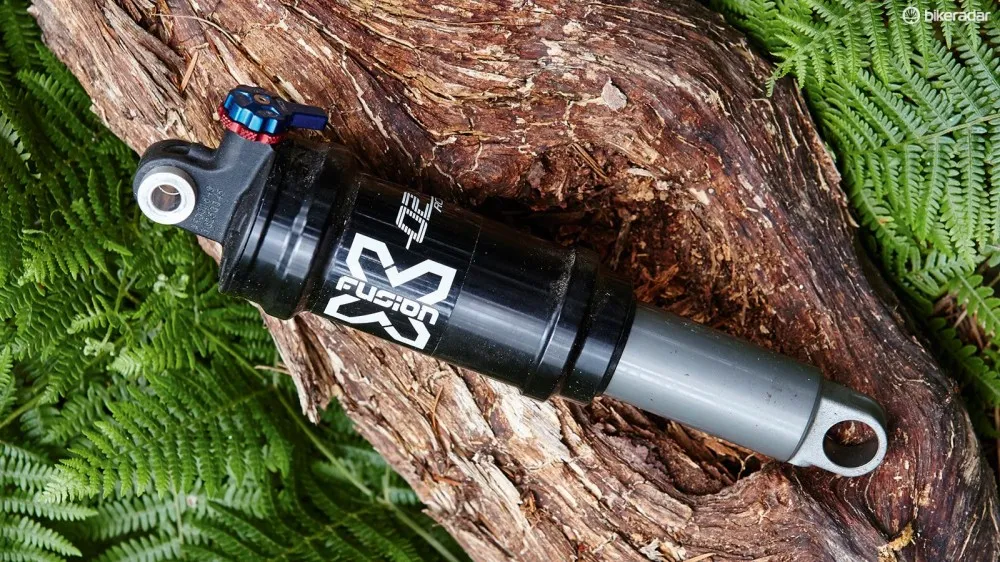
- Price: £340 / US$430 / AU$566 (Sold by DIY-MTB)
- Weight: 275g
- External adjustment: Low speed compression, lockout, rebound
- Sizes: 165x38, 184x44, 190x51, 200x51, 200x57mm
X-Fusion's shocks are common on more affordable full-sus rides, so the aftermarket price of its RCX might be a shock in itself. There's plenty of midstroke support for aggressive cornering, giving the host bike a planted feel that transmits power well when you stab the pedals. Two intermediate ‘platform’ settings between open and locked make it easy to fine-tune feel on the fly. It can be tuned into a supportive and consistent state that aggressive riders will appreciate, but it stayed the least buoyant and dynamic feeling shock on test. Given how much we liked it in a Santa Cruz Tallboy LT CC long-termer a couple of years ago, a relatively disappointing showing this time round shows how far other brands have advanced rather than suggesting XF has gone backwards.
• Verdict: Supportively damped but slow bed in and relatively insensitive stroke now leaves X-Fusion looking outclassed for the cash.
Read our full review of the X-Fusion O2 RCX
Overall verdict
The pace of shock development has been blisteringly quick in recent years and even months, which is great for buyers but hard work for suspension developers. It’s certainly left X-Fusion's thoroughly decent O2 RCX looking outdated in performance for price terms. Cane Creek’s DBinline is still superb in terms of midstroke damping and adjustability, but setup can stretch patience and revamped reliability is yet to be proved.
DT Swiss continues to be a good choice for riders looking to save weight in a firm-pedalling but usefully controlled shock, while French specialist BOS offers the ultimate in unapologetically race tuned suspension feel for those who can afford it. It’s a tribute to RockShox’ solidly practical engineering that the Monarch Plus still delivers consistently impressive all round control and traction from just simple, user friendly adjustments.
Fox has charged straight back into the lead with their latest evolution of the long running Float family though. The EVOL is more sensitive than before, yet more supportive in the mid stroke and more controlled when walloping through or off big stuff. Remapped valving means more riders are likely to be able to get their Float feeling how they want more of the time too and you don’t even have to pay a premium for the privilege.
